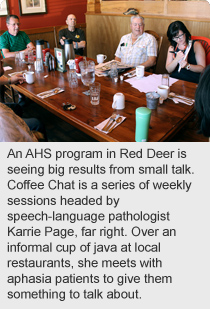
March 31, 2015
Story and photo by Heather Kipling
Imagine having your ability to order a coffee and carry on a conversation with a friend drastically changed, or taken away completely.
Imagine being struck with difficulty remembering words or losing your speech all together.
In all fairness, the thought of having to try and make it through such an outing might be enough to keep you from even trying.
 Those are some of the possible scenarios speech-language pathologist (SLP) Karrie Page is hoping a specialized support group can prevent. Page, who works at the Red Deer Regional Hospital Centre (RDRHC) outpatient rehabilitation department, facilitates Coffee Chat, a weekly gathering for patients with aphasia, which is often the result of a brain injury or stroke.
Those are some of the possible scenarios speech-language pathologist (SLP) Karrie Page is hoping a specialized support group can prevent. Page, who works at the Red Deer Regional Hospital Centre (RDRHC) outpatient rehabilitation department, facilitates Coffee Chat, a weekly gathering for patients with aphasia, which is often the result of a brain injury or stroke.
Aphasia can be defined as a disturbance of the comprehension and expression of language caused by dysfunction in the brain, ranging from difficulty remembering words to losing the ability to speak, read, or write.
“We often say that aphasia holds your words hostage. You know what you want to say, but can’t get the words out,” says Page. “Coffee Chat provides opportunities for patients to
interact with others, enjoy a coffee, and have conversations in a supportive environment where they can feel comfortable practising, or trying, their communication skills.
“Sometimes following a stroke, patients with aphasia may not be comfortable rejoining their friends or returning to a regular coffee routine, in light of difficulties in communicating but, with this group, they can talk with others who know what they’re going through.” Page specializes in aphasia patients and, since 2002, has used the Coffee Chat group as a key part of the rehabilitation support she provides. “Aphasia is chronic. It can change over time but it doesn’t go away. Some of those who
come have mild aphasia, others are more severe. Lots of people say they don’t want to join a group, but once they get here that all changes,” she says.
The weekly gatherings range in size from three to 12 participants and are often held at local restaurants. The Golden Circle, a seniors community centre in Red Deer, also supports the group.
Terry Walz wasn’t sold on the idea of the group at first. Neither was Leo Proulx. However, both are now regular attendees and encourage others to give it a chance.
“I thought I wasn’t a group person, but Karrie persisted and, when I came for the first time, I knew she was right,” says Walz. “I enjoy it. It’s helped me speak better and it has given me confidence in myself when I’m talking to friends.”
Proulx agrees.
“It makes you more confident,” he says.
The boost in confidence Page says, is one of the key benefits provided by the gatherings.
“Confidence is such a big part of communication for everyone. We have a couple of members who have been coming for a decade, some for only a few months, but you can see their confidence grow. And that is a big part of recovery.”
Wayne Hagel has been attending for over two years and says Coffee Chat has also been a good way to make new friends. “I want to talk to people and here I can do that with friends. It helps a lot.”
Conversations over coffee range from current events to family life, enabling participants to stay involved with their community and connect with others who have aphasia. Page uses cues to guide discussions and support patients when words escape them. Often, other participants will help one another.
Wayne Maki comes with his father, Earl, who has been attending for several months following a stroke.
“Everyone has a different level of aphasia here; they all understand what it’s like living with it,” Wayne says.“It’s such a supportive environment, but also one that encourages people to keep trying. Everyone has a different way to cope, to help them through, and they share those to help each other.
“It’s a great thing for my dad to be a part of.”